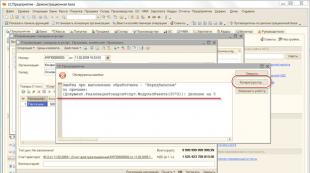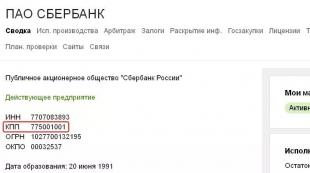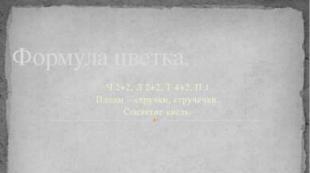Learn more about the types of disciplinary sanctions provided for by the Labor Code of the Russian Federation. Application and execution of disciplinary action Disciplinary action and dismissal on appropriate grounds
Everyone chooses where to work and can decide to quit. Sometimes circumstances develop in such a way that the employee’s opinion loses importance and his fate ends up in the hands of the employer.
Why can an employee be fired without his or her desire? Art. 81 of the Labor Code of the Russian Federation is devoted to this issue.
- (, reduction, change of owner of the enterprise, insufficient level of qualifications);
- for guilty actions (disciplinary offences).
Why can you be fired?
A measure that an employer can use as punishment for culpable violations of labor discipline and routine committed by an employee.
Not every discipline can lead to dismissal. Its imposition is a right, not an obligation, so there is a chance that the employee will be forgiven and punished more leniently.
If the employer is determined, then he needs to record:
- several cases of failure to fulfill labor duties without good reason;
- single gross violation.
The first group of violations includes:
- absence from work;
- violation of instructions;
- orders;
- orders;
- failure to perform duties;
- established in the employment contract;
- evasion of mandatory training or examination, etc.
To the second:
- absence from work for more than 4 hours without legal grounds ();
- appearing at the place of performance of official duties in a state (no matter what caused it);
- disclosure of classified information;
- embezzlement;
- appropriation of someone else's property at work;
- a serious accident or the occurrence of its danger due to the employee’s violation of labor protection rules;
- etc.
Dismissal procedure

- The commission of violations is documented (explanations of eyewitnesses, medical examination, act revealing the theft, etc.),
- The employee is asked to explain the violation he committed (two days to write).
- The imposition of a penalty is formalized by order.
- Based on the above order, it is drawn up.
- A calculation is made (in general, salary + compensation for unused vacation).
- Introduced (wording according to the Labor Code of the Russian Federation, indicating a specific violation, if there are several of them in the wording).
- On the day of termination of the employment relationship, the employee is given a work book and a paycheck.
There are rules that an employer must follow when imposing a disciplinary sanction, including one entailing dismissal:
- decision-making on its use is given to month from the date of the commission of the offense or the entry into force of a decision of a court or other competent body based on the results of consideration of a report of misappropriation, theft, embezzlement;
- You cannot be fired during periods of incapacity and vacation;
- Before imposing a penalty, it is necessary to obtain an explanation from the employee.
Cases of dismissal being declared illegal
Pregnant women generally cannot be fired, no matter what they do (exceptions: liquidation or termination of the organization).
Moreover, it does not matter whether the employer was informed about their “delicate situation”.
Thus, according to the Determination of the Supreme Court of the Russian Federation dated January 19, 2015 N 18-KG14-148, dismissal for absenteeism during the period of temporary disability of pregnant citizen N. was recognized, despite the employer’s arguments that N. did not inform him of her situation and did not informed that she was on sick leave.
The court explained that when resolving the issue of reinstating N. at work and paying her the wages not received since the dismissal, only the fact of her pregnancy matters. Taking into account other arguments leads to a violation of the guarantees established by law for pregnant women.
The imposition of penalties on pregnant women that do not entail dismissal is permitted if there are grounds for it.
There are other grounds on which an employee can: 
- dismissal for something that the employee did not commit (on this basis, reinstatement is possible not only when there is really no fault of the dismissed person, but also when the employer did not properly record the violation, as a result of which he cannot prove that it actually took place);
- the procedure for imposing a penalty was violated (the deadline was missed, the employee’s explanation was not requested before it);
- error in choosing the reason for dismissal.
Let's consider another example from judicial practice.
In January 2011, the Gusevsky City Court of the Kaliningrad Region considered the claim of citizen M. for reinstatement at work, recovery of unpaid payments, etc.
To substantiate her demands, M. explained that she was fired for loss of trust, despite the fact that on this basis only persons servicing monetary and commodity assets are fired, which she did not do.
The circumstances of the dismissal were as follows: M. wrote an application for leave and, without waiting for his approval, left on a voucher to a sanatorium. Later, having learned that she had not been granted leave, she handed in her voucher, spent several days on sick leave, then came to work, where she learned that she had been fired for loss of trust.
The employer justified its position by the fact that M. was a financially responsible person, took money accountably and accepted material assets in the process of performing her duties. In addition, she kept a time sheet and noted in it the days of her absence as worked (M. did not deny this).
The court found that, despite the above, M. is not a person servicing material assets, the fact that she entered false information into the report card does not act as a basis for dismissal, and therefore does not matter in this process.
In addition, it was established that no check was carried out regarding M.’s absence from the workplace, no explanation was requested from her regarding this fact, and the month period from the moment the violation was committed was missed.
The court reinstated M. at work, recovered in her favor the lost wages and compensation for moral damage.
In this case, the employer committed a number of violations: 
- He did not document M.’s absence from the workplace and did not check this fact.
- He did not ask M. for an explanation before imposing a penalty.
- He chose the wrong wording for dismissal (she should have been fired for absenteeism).
- Missed the penalty deadline.
Due to a violation of the established procedure, despite the existing legal grounds for dismissal, the employer suffered losses and reinstated M. in his position.
It is necessary to approach the issue of dismissal extremely carefully, double-checking all documents and wording, and studying the judicial practice of reinstatement.
It is the practice of courts that most clearly demonstrates the mistakes made most often and allows one to calculate possible risks.
For the employee, it is best to avoid the appearance of “black marks” in the work record (after all, it is one for life) and try to negotiate with the employer when problematic situations arise. After all, for employment they often require a reference from a previous place of work and study the reasons for parting with the previous employer, and not everyone will want to accept someone fired under the article into the ranks of their employees.
By clicking on the send button, you consent to the processing of your personal data.
One of the key factors for the successful functioning of a company is the formation of labor discipline rules in it, which ensure high labor productivity, optimal use of labor resources, and also prevent failures in its work.
To achieve this effect, any organization develops and adopts internal regulations - labor rules, functional responsibilities of employees, working hours, etc. If employees fail to comply with the conditions specified in them, they are applied disciplinary action.
Under labor discipline one should understand submission to the rules of behavior that are enshrined in labor legislation and internal regulations (Article 189 of the Labor Code of the Russian Federation). At the same time, dismissal is a disciplinary sanction, which acts as a last resort measure to suppress the most serious violations of labor discipline.
Since disciplinary action is a way to suppress acts of violation of labor discipline, in order to hold an employee accountable, the company’s management will have to prove:
- Availability of facts of violation of labor duties;
- Wrongful acts of an employee;
- The employee’s guilt and its degree;
- The connection between employee actions and adverse events in the functioning of the enterprise.
Disciplinary action, including in the form of dismissal of an employee, has the right to be applied to members of the workforce only by the head of the organization, who signs a separate order on this issue.
Disciplinary action
Russian labor legislation establishes three main forms of disciplinary sanctions that can be applied to employees:
- Firstly, rebuke– authoritative condemnation of the employee’s unlawful acts or his inaction in certain situations, requiring a written explanation of the reasons for such behavior;
- Secondly, comment– an indication of an error in the employee’s work and the need to correct it;
- Third, dismissal– termination of an employment contract due to serious violations in the employee’s activities.
The practice of companies imposing other disciplinary sanctions, which are reflected in internal regulations, is considered illegal. These may include fines, deprivation of bonuses, warnings, transfer to a position with lower pay. At the same time, a reprimand and reprimand can be used in conjunction with measures of material sanctions in the form of a fine or deprivation of a bonus.
It is worth emphasizing that if a company has a network of branches, their managers have the right to apply disciplinary sanctions to employees - central management does not necessarily have to delve into issues of violation of labor discipline at the division level.
Dismissal for disciplinary action against an employee is the most serious measure to prevent illegal acts. As a rule, in this case, the employee commits such actions that show the employer that further cooperation with this person will not be beneficial for the company. As a result, the employee is dismissed at the initiative of management.
Procedure for applying disciplinary sanctions
How to apply disciplinary sanctions if there is a violation of labor discipline? In this process, it is important to strictly observe all the nuances so as not to provide reasons for lengthy legal disputes with the employee.
- Written explanation.
If a violation is detected, then the first thing the employer must do is ask the employee for a written explanation of his behavior (Article 193 of the Labor Code of the Russian Federation). Explanatory letter can help an employee avoid disciplinary action in the form of dismissal, because if he correctly states the facts and describes the reasons that influenced his action, then perhaps the case will turn out in his favor.
- Drawing up an act.
If, after two days after the notification, the employee has not provided the employer with an explanatory note, a report on the absence of explanations regarding the violation of labor discipline from the employee is drawn up.
- The gravity of the committed act.
The employer must not only record the fact of violation of labor discipline by the employee, but also determine the severity of the offense (Article 192 of the Labor Code of the Russian Federation), since the type of disciplinary sanction applied depends on this . What factors are important to consider in this case?
- The nature of the employee’s activities before the offense was committed (awards, professional achievements, as well as earlier penalties);
- The presence of a fact of harm to the organization due to violation of labor discipline by an employee;
- The circumstances under which the offense was committed.
- Time limit for bringing to responsibility.
The employer has the right to apply disciplinary sanctions only within a month after the actual commission of the offense. In this case, the period will be extended if the employee:
- Is on vacation;
- Is on sick leave;
- Went on a business trip.
At the same time, even in the presence of the above circumstances, penalties should be applied no later than six months from the moment the offense was committed.
There is one assumption: if the employee’s misconduct was revealed during an audit or audit, then disciplinary action can be applied within two years from the date of taking measures to verify the financial and economic activities of the company.
- Manager's order.
After the explanatory note has been considered and all the circumstances of the employee’s misconduct have been studied, the head of the organization signs an order to apply a disciplinary sanction.
Within three working days, the employee is familiarized with this document against signature. If he refuses to do this, a corresponding act is drawn up.
Regardless of the severity of the employee’s guilt For one offense, only one disciplinary sanction can be applied to him. If the employee is a member of a trade union, then in addition to an explanatory note from himself, the employer requests a letter regarding the commission of an offense from the trade union committee.
Dismissal as a disciplinary measure
Many employees wonder: is dismissal a disciplinary sanction? Without a doubt, it is. However, the employer has the right to apply it only if there has been a gross violation of labor discipline, which means (Article 81 of the Labor Code of the Russian Federation):
- The presence of several facts of failure to fulfill labor duties without good reason;
- A gross violation that occurred once (absenteeism, operating while intoxicated, disclosing secrets protected by law, theft, violation of labor safety rules with grave consequences, embezzlement, damage or destruction of company property).
Thus, gross disciplinary offenses lead to the destruction of property values, immoral behavior, loss of trust on the part of the company's management and damage to the company.
Dismissal may apply to an employee if:
- Previously, reprimands and reprimands had already been used against him;
- At the time of the gross misconduct, the employee had an outstanding disciplinary sanction (in the order and dismissal order, the manager indicates the dates and numbers of outstanding comments and reprimands).
Duration of disciplinary action- one year. Consequently, after a year has passed from the moment the offense was committed, it is considered that it has been repaid legally. This rule applies to both comments and reprimands.
If an employee comes to work in a state of intoxication, then an act of misconduct is drawn up on the spot, which is signed by at least two witnesses from among the colleagues of the offending employee. The offender is suspended from work duties for the entire working day.
Since disciplinary dismissal is an extreme measure of suppression of violations of labor discipline, it must have substantial grounds: documentary evidence of the employee’s misconduct, information about previously applied disciplinary sanctions against him, written evidence from colleagues, etc.
It is worth noting that an employee has the right to file a claim in court, requesting assistance in resolving a labor dispute (Article 57 of the Civil Code of the Russian Federation). On what grounds can an employee challenge disciplinary dismissal?
- Prove the absence of misconduct;
- Indicate the employer’s violation of the procedure for applying penalties;
- Establish that the measures applied to him are unjustifiably strict.
If the unlawfulness of dismissal as a disciplinary measure is proven in court, the employee may be reinstated in his position by a court decision, and he will also be entitled to compensation from the employer. The company itself will be forced to cover all legal costs.
That is why the application of disciplinary dismissal requires taking into account a lot of small details: receiving an explanatory note, familiarizing yourself with the manager’s order against signature, drawing up acts, etc.
Dismissal for disciplinary action is an extreme measure to suppress violations of labor discipline. It can only be applied if there has been a gross one-time violation or a series of small systematic offenses. Despite the fact that Russian legislation does not contain clear instructions on the use of disciplinary dismissal, such a serious measure of influence requires documentation of the legal relationship between the employer and the employee at each stage of its use.
There are three ways to punish employees who violate labor laws - reprimand, reprimand, dismissal. The Labor Code of the Russian Federation (Part 1 of Article 192) prohibits the application of disciplinary sanctions not provided for by federal laws.
Disciplinary action
The employer may punish an employee for improper performance of job duties (Article 192 of the Labor Code of the Russian Federation). The degree of censure is proportional to the severity of the offense committed.
1. The lightest punishment
The violator of production rules receives penalties:
- Comment.
- Reprimand (simple, strict).
- Warning about insufficient professional competence.
If we are talking about a military violator, as punishment for a disciplinary offense, he may be deprived of his next dismissal, an excellent badge, assigned an assignment out of turn, demoted in position and military rank, etc.
According to the law, a violator faces only one punishment for one offense. But there are no restrictions on the number of punishments (for various violations). The employer has the right not to question the employee too harshly for minor sins and limit himself to a verbal reprimand, but also has the right to reprimand for each offense.
How many reprimands are needed for dismissal is regulated by Art. 81 Labor Code of the Russian Federation. A reprimand and reprimand are the lightest disciplinary punishments. However, under certain conditions, one reprimand is enough to dismiss the offender
2. The most severe punishment
If the disciplinary offense is serious, the employee will face dismissal. The grounds for dismissal are specified in Art. 81 Labor Code of the Russian Federation.
You can be fired for:
Additional Information
To present an order to apply a disciplinary sanction to the manager, it is necessary to correctly formalize it by preparing a documentary base, such as: 1) sources recording the misconduct (memorandum, commission act); 2) notifying the employee of the need to write an explanatory note; 3) in the absence of an explanatory note - an act to this effect; 4) in case of refusal to sign an order of reprimand by an employee - also a corresponding act.
- Repeated failure to perform work duties without good reason and the presence of a reprimand.
- One-time gross violation of labor duties.
- For making an unreasonable decision by department heads that caused damage, or for violating their official duties.
- For loss of trust.
- Committing an immoral act by an employee working in the field of education.
If a manager decides to part with a habitual offender, this must be done without circumventing the rules established by law. Otherwise, the dismissed person may go to court. If he considers the dismissal’s claim to be justified, the employer will have to cancel the punishment, pay legal costs, moral damages, etc.
Removal from office for one-time gross violations
Such violations are considered:
- Absenteeism, absence from work without good reason for more than 4 hours.
- Being intoxicated at work.
- Violation of the confidentiality regime regarding information obtained during work, disclosure of personal information about another employee.
- Theft, embezzlement, intentional damage to property, if the fact is recorded and confirmed by a court decision.
- Failure to comply with labor safety standards, resulting in an accident, breakdown, catastrophe, etc.
- When performing transactions with the organization's funds, illegal actions were committed and trust was lost.
As we can see, the law allows the application of the most severe penalty - dismissal - for a one-time violation, if it is included in the list established by the legislator.

Dismissal for reprimand
A reprimand is a verbal punishment. If there are legal grounds, dismissal for reprimand follows. The Labor Code of the Russian Federation determines how many times a reprimand can be received before an employee can be released from work.
When a reprimand is considered extinguished. To reprimand, the manager issues an order and familiarizes the violator with it against signature. If within a year from the date of announcement of the reprimand the employee has not committed a single disciplinary offense and has had no penalties, the reprimand is considered extinguished. If an employee constantly fails to fulfill his duties, violates the routine, and at the same time has an outstanding reprimand, the employer can dismiss such an employee (Clause 5, Part 1, Article 81)
Can I be fired for two reprimands? As established by law, one can be fired for one reprimand if it is not repaid and the employee is caught in another violation.
The procedure for dismissing an employee under clause 5 of Article 81 of the Labor Code of the Russian Federation
Some facts
Before an order is issued to apply a disciplinary sanction, the employee is required to provide a written explanation (Article 193 of the Labor Code of the Russian Federation). With its help, an employee can explain his misconduct, indicating good reasons for committing it. The Labor Code of the Russian Federation does not explain in what form the manager must request this explanation. Therefore, if an employee is ready to present an explanatory note, the requirement need not be made in writing. If the conflict is quite serious, then it is better to formalize this requirement in writing and give it to the employee against signature. If the employee refuses to provide a signature on the request, a corresponding document must be drawn up.
When starting work, everyone must familiarize themselves with their job responsibilities against signature. This is necessary so that the offender can be held accountable in the future. The employee is also explained after how many reprimands they can be fired in accordance with labor legislation.
If an employee is aware of the internal labor regulations and job responsibilities, but does not fulfill them or performs them poorly, this is classified as a violation of labor regulations and gives the right to dismissal.
Failure to perform official duties is permitted only if there are good reasons
Dismissal for dishonest performance of duties must be formalized as follows:
- Clarify to which category of workers the person who violated the rules belongs. Art. 261 of the Labor Code of the Russian Federation, it is not allowed to dismiss pregnant women and women with small children.
- Prepare a document confirming that the offense was committed again.
- Check whether a year has passed since the date of the previous reprimand.
- If more than a year has passed since the date of the first reprimand, the employee cannot be fired; a new reprimand can be issued.
- Take a written explanation from the employee (Article 193 of the Labor Code of the Russian Federation). If an explanation is not given within 2 days, a report is drawn up.
- Check whether the reason for committing the offense was valid.
- Write a dismissal order and familiarize the person being dismissed with it against signature. If the employee refuses to sign the order, a report is drawn up.
Make a settlement with the employee and return his employment record with a note about the reason for dismissal and the norm of the article of the Labor Code of the Russian Federation.
Features of disciplinary sanctions are discussed in the video
What entry is made in the employment record of a person dismissed for violation of discipline?
In cases where the employer does not want to continue working with an undisciplined employee, there is no point in issuing another reprimand for misconduct. Reprimand and dismissal are types of disciplinary action. According to the law, you cannot be punished twice for one violation.
By issuing a reprimand, the employer will not be able to fire the unwanted employee, at least until he commits the violation again. Therefore, if you want to part with an employee immediately, you need to prepare a dismissal order after the next violation.
Dismissal in the event of a severe reprimand, other non-existent disciplinary sanctions, as well as when the reprimand is outside the normative framework, can be quite successfully appealed by the employee in court.
In this case, the court may oblige the employer to forcibly reinstate the employee to his previous job. If the organization does not do this, it will need to pay the employee wages for all the time that he was not present at work, although by virtue of a court decision he should have been there (Article 396 of the Labor Code of the Russian Federation).
At the same time, a corresponding entry is made in the work book of the dismissed person. It reflects:
- date of dismissal;
- statement of the reason for dismissal;
- reference to the law on the basis of which the employment contract was terminated;
- dismissal order number.
The employer, when signing a dismissal order, must remember the validity of such an action. If an employee is dismissed on a basis that is not specified in the norms of the Labor Code and is not sufficient for dismissal, the decision can be appealed to the state labor inspectorate, the labor dispute commission, or in court.
We are ready to answer any questions you may have - ask them in the comments
Dismissal of an employee for disciplinary action is a fairly common occurrence. If a person violates the labor code, the employer has the right to apply punishment. Note that this is not a necessary measure, so the employee can avoid problems if the boss decides to forgive for the first time. However, the manager can even fire for a violation if it turns out to be serious, or the person regularly fails to comply with the Labor Code of the Russian Federation. That is why you should know how layoffs work and what reprimands can lead to you losing your job.
About collection
Disciplinary action occurs when employees violate the rules that must be followed at work. There are different situations in which an employee can be punished by being reprimanded or taking more serious action. Note that the penalty is imposed depending on what exactly the person did (or did not do). Therefore, you can get by with just a warning, but in severe cases, the boss has the right to even dismiss you under the article.
Dismissal as a disciplinary sanction can be applied only in two cases:
- The person failed to fulfill his job duties several times in a row. However, he had no good reason for this.
- One gross violation.
Naturally, the boss can independently decide when it is necessary to fire an employee, and in which cases a less drastic measure can be used. That is why it is impossible to say unequivocally how much one needs to violate the Labor Code in order to be laid off, because the situation is purely individual.
Note that some people also want to know if there is a certain period after which they cannot be held accountable. Note that if the penalty was more than three months ago, then they will no longer be able to dismiss you under the article. Therefore, if the boss tries to intimidate an employee in this way, although a lot of time has passed, then you need to remember about the limitation period.
Causes
There are certain reasons why dismissal may be used as a disciplinary measure. Moreover, certain violations are considered mild, while others are considered severe.
It is important to understand the difference, because in the first case a reprimand or reprimand is usually made, while in the second a reduction is possible.
Mild violations:
- Short absence from work.
- Failure to comply with instructions, orders and duties.
- Avoidance of mandatory examination or training.
In order to be fired, you need to have misbehaved several times, because on the first occasion you are not removed from your position. But, of course, if possible, the above violations should not be allowed, because in the end this could end badly. It’s even worse if a person makes gross mistakes, because because of this, the boss can immediately remove him from his position.
Among them:
- The man skipped work. That is, he was absent for more than 4 hours without reason. Therefore, it is necessary to warn about this and negotiate. It’s even better if there is a document that confirms the legality of the absence.
- Industrial theft or embezzlement.
- A person allows himself to show up to work drunk. Once is enough for you to decide to cut back. Therefore, one should not allow one to become intoxicated when it is necessary to go to work. And it doesn’t matter whether it’s alcoholic or narcotic.
- Disclosure of classified information.
- An accident or danger occurs due to the employee’s failure to comply with labor safety rules.
- Appropriation of someone else's property.
- Loss of trust.
In such a case, dismissal can be used for an employee for a disciplinary act. But, of course, this is done at the discretion of the manager. However, if the employee is not considered valuable, then he may not be forgiven for such behavior.
It should now be clear whether a certain violation is gross. Of course, crimes in most cases will be severely punished by the director of the company. Because companies are not interested in employing people who, for example, would forge documents or steal.
Dismissal procedure
Dismissal of a person due to disciplinary action takes place in a certain order. The situation turns out to be unpleasant when someone is laid off based on an article, because with such an entry in the work book it is much more difficult to find a new job later. However, if a person has committed a gross violation, then comments alone will no longer be enough.
Procedure:
- Violations must be documented. This could be an explanatory statement from eyewitnesses, a medical examination, or an act of theft.
- The employee must explain why he committed such an act. He will be given exactly two days to give an explanation.
- An order is issued to impose a penalty.
- Next, an order is issued to lay off the employee.
- The calculation is being carried out. A person is given a salary and money for unused vacation.
- A note is made in the work book. There it is necessary to refer to the specific violation due to which you were removed from your position.
- All necessary documents are given.
After this, the business relationship between the employee and the company ends. However, for everything to go smoothly, you need to remember certain points. First of all, about the fact that exactly one month is allotted for making a decision from the moment a person makes a mistake. Or you will have to wait until the decision of the court or other authorized body comes into force. You should not postpone your dismissal until later, otherwise it may not be possible to reduce the person under the article.
Important! It must be borne in mind that you cannot be removed from a position if a person is on sick leave or on vacation. We will have to wait until the person returns to work.
It doesn’t matter how long you have to wait, several days or months. Because it is impossible to lay off an employee at such moments, and this action can be considered illegal.
You definitely need to get an explanation from the person regarding the action. Because otherwise the procedure cannot be considered successful. Certain difficulties may arise if the boss does not follow the above scheme.
The person himself must check whether all the necessary documents and money are given to him. Because even if a person has committed a violation, her rights still cannot be infringed. Therefore, withholding the work book can be considered a wrong action on the part of the organization. You can contact the Labor Protection Inspectorate, the prosecutor's office or the court. This way you will be able to achieve justice and get your documents or money.
If the company did everything correctly, then the person will only have to look for a new place to work. Because this will end the cooperation with the previous company. And in the future it will be necessary to comply with the legislation so as not to encounter similar problems.
Recognition of dismissal as illegal
It also happens that the layoff turns out to be unlawful, and therefore the employee wants to defend his rights. Such cases are not so rare, and if, indeed, there are grounds to consider the decision of the authorities to be illegal, then you can try to defend justice.
First of all, we note that most often a pregnant woman cannot be fired. This becomes possible if the company is liquidated. But if you try to reduce it due to a serious violation, then most often the government authorities will be on the side of the expectant mother. Therefore, it is best for the boss to take any disciplinary action other than layoffs.
You can also try to challenge the decision if the person actually did nothing. That is, they deliberately made him guilty, or they made a mistake when searching for the real offender. In this case, it is necessary to prove that the accusation is false. It is also important for the boss to properly record the person’s actions, because if this is not done, then the removal from office can be challenged.
Another reason to defend your rights is that the deadline for imposing a penalty was missed, or an explanation was not requested. In such situations, the boss’s actions seem illegal. Therefore, it is important for the organization to strictly follow the order so that problems do not arise later.
You can also try to challenge it if another reason was given. It is important that the boss refers to the correct article. If this is not done, then the dismissal can be declared unlawful through the court. However, if the organization does everything correctly, then it will no longer be possible to find fault with its actions. You will have to come to terms with the loss of your job and in the future avoid situations that could lead to serious disciplinary action, especially removal from work duties.
In the relationship that develops between the employer and hired employees, the discipline established in the work team is of no small importance, helping the head of the company to manage it, and the employees to be as focused, responsible and efficient as possible.
Attention
To achieve this goal, the employer, with the help of approved local regulations (LNA), prescribes certain rules of behavior in the organization that are mandatory for all employees. Failure to comply or dishonest compliance with these rules is classified as a disciplinary offense, for which the manager has the right to issue a reprimand.
What is a reprimand?
One of the forms of penalties is a reprimand, which is expressed in official censure of an offense in writing - an order. The wording of this punishment can only sound like this - contrary to popular belief, no other types of reprimand, such as “severe reprimand”, “reprimand with entry”, etc. According to the current Russian legislation, they do not exist, and their use has been recognized as unlawful in judicial practice.
For your information
The very concept of a disciplinary offense in the form of a reprimand implies failure to fulfill or improper performance by an employee of the duties assigned to him in the employment contract, job description, as well as the employer’s LNA.
Violation of labor discipline will be considered: failure by an employee to fulfill his immediate duties, being late or absenteeism for work, committing theft or damage to property, appearing in a state of any kind of intoxication, providing false documents during employment, etc. Some of these violations are enshrined in federal labor legislation, others may be reflected in local regulations of the employer, and in order for these provisions to have legal force, the organization’s staff is familiarized with them against signature.
Labor Code of the Russian Federation
Issues of issuing and canceling disciplinary sanctions are regulated by Chapter 30 of the Labor Code of the Russian Federation (articles - Labor Code of the Russian Federation).
The competence of the head of the organization includes the right to apply to the employee one of the following approved by the Labor Code of the Russian Federation: penalties for committing labor misconduct(Article 192 of the Labor Code of the Russian Federation):
- make a remark;
- reprimand;
- terminate the contract with the negligent employee.
There are no criteria by which one violation of discipline can be condemned with a remark, and another with a reprimand; this issue is decided by the employer in each individual case individually, taking into account the nature of the act committed by the employee, as well as the severity of its consequences. as a measure of punishment can be carried out only on the grounds provided for in clauses 5, 6, 9 or 10 of the first part of Article 81 or clause 1 of Article 336 of the Labor Code of the Russian Federation.
IMPORTANT
The basis for “dismissal for reprimand” does not exist as such in the law; its use would be a grave mistake for the manager and could subsequently become a reason for legal proceedings.
How many reprimands are enough for dismissal?
This criterion is not established by law. But dismissal of an employee for a reprimand can only be carried out under the following conditions:
- the employee has failed to fulfill his duties repeatedly and already has existing disciplinary sanctions;
- The employee committed a single gross violation of discipline.
In the first case, the company's management has the right to dismiss an employee when a new violation of discipline is recorded, if before that he has already been punished for guilty labor actions, and it has not yet been extinguished.
Additional Information
Termination of an employment contract with an employee who has no disciplinary sanctions is permissible only on the grounds set out in clause 6, part 1, article 81 of the Labor Code of the Russian Federation. The list has been recognized by the courts as exhaustive and cannot have expanded interpretations.
Step-by-step instructions for dismissal for a reprimand
Defines a fairly clear procedure for issuing disciplinary sanctions. Failure to comply with the established procedure when terminating an employment contract as a penalty can be challenged by the employee in court with all the ensuing consequences for the employer.
- The procedure for dismissal for a reprimand involves the following legally significant steps: Any disciplinary violation must be documented.
- Proof of it can be a report from the employee’s immediate supervisor, statements from eyewitnesses of the event, the results of a medical examination, audit reports indicating theft, etc. The person guilty of violation of discipline must give an explanation of his offense in writing.
- The employer’s requirement to state the reasons for his behavior is also best formalized in an official letter registered through the office of the institution. The employee is given 2 working days to provide explanations.
- If after the specified time they have not been provided, a corresponding act is drawn up. Next, an order is issued to dismiss the employee under clause 5 of part 1 of Article 81 of the Labor Code of the Russian Federation - if he already has outstanding disciplinary penalties.
If a single gross violation of official duties is committed, the contract is terminated under clause 6 of part 1 of Article 81 of the Labor Code of the Russian Federation.Attention
- The issuance of such an order is possible only within 30 days from the moment when the commission of an offense was recorded; after this period, the use of disciplinary sanctions is prohibited. This period does not include the absence of an employee due to illness or vacation, as well as the time spent assessing the situation by the employee representative body. If these circumstances exist, the general period giving the head of the organization the right to apply penalties is limited to a period of 6 months. An exception is made for violations identified as a result of an audit, an audit, or an inspection of the organization's FCD - in this case, a penalty can be issued within 24 months. The order is presented to the employee for review within 3 working days.
- If he refuses to sign, a corresponding act is drawn up.
If the contract is terminated for repeated violation of discipline, disciplinary sanctions for existing offenses must be confirmed. Their design is subject to the same requirements described above. The period from the application of these penalties to the dismissal of the employee cannot exceed 12 months.
Entry in the work book
When dismissing an employee for violations of discipline, the personnel service of the organization makes a corresponding entry in his work book. It should reflect:
- date of termination of the contract;
- wording in accordance with the article of the Labor Code and indicating a link to it;
- number and date of the corresponding order.
Dismissal of a disabled person for a reprimand
Labor relations with employees with disabled status have their own characteristics and limitations. In these cases, the legislation imposes more stringent requirements on employers, and working disabled people of all groups are provided with a fairly extensive range of social guarantees and benefits aimed at preserving their health and protecting their rights in labor conflicts.
For your information
But as for termination of the contract for violation of official duties in the absence of valid reasons, in this case the law protects the interests of the employer - a disabled employee who is dishonest and irresponsible about his work can be dismissed for guilty labor actions on a general basis.
Dismissal of a disabled person for a reprimand is permissible subject to strict compliance with the following conditions:
- this employee has previously been subject to disciplinary sanctions;
- these collections are not repaid;
- The procedure for terminating a contract for misconduct was followed in accordance with the Labor Code of the Russian Federation.
In general, the procedure for dismissing a disabled person for a reprimand does not differ from the general procedure for terminating a contract for disciplinary offenses.
Dismissal for reprimand while on sick leave
Limits the period of possible application of penalties to a period of 30 days from the date of establishment of the disciplinary offense; the time of absence of the employee due to illness is excluded from it. This clause means that an employee cannot be fired during the period of his incapacity, but the monthly period established for applying a penalty is increased by the time the employee is on sick leave. It is possible to punish him for a reprimand upon expiration of the certificate of incapacity for work, but no later than 180 days from the date of the commission of the offense.
Dismissal for reprimand after maternity leave
By virtue of Article 261 of the Labor Code of the Russian Federation, it is expressly prohibited to apply disciplinary punishment in the form of dismissal to pregnant employees.
According to Article 193 of the Labor Code of the Russian Federation, penalties can be imposed no later than 30 days from the date of the violation of discipline, not counting the period of incapacity of the employee (this also includes maternity leave). At the same time, it is not permitted to apply disciplinary penalties later than 180 days from the date of commission of the labor offense.
For your information
Termination of a contract with an employee for repeated violation of discipline is permissible only if he has previously applied outstanding penalties. The period from the application of these penalties to the dismissal of the employee should not exceed 1 year.
Thus, the dismissal of a woman for a reprimand will not have legal grounds.
Nuances
If an employer decides to dismiss an employee, he must ensure that his actions are justified and evidence-based. First of all, when applying disciplinary punishments, it is necessary to strictly adhere to the procedure for issuing them, as outlined by the Labor Code of the Russian Federation. In addition, punishment can only be applied for the employee’s failure to fulfill those duties that are established by federal legislation or reflected in the provisions of documents endorsed by him personally (employment contract, job description, various LNAs operating in the organization).
Attention
Recording of disciplinary sanctions in the work record book is not permitted.









